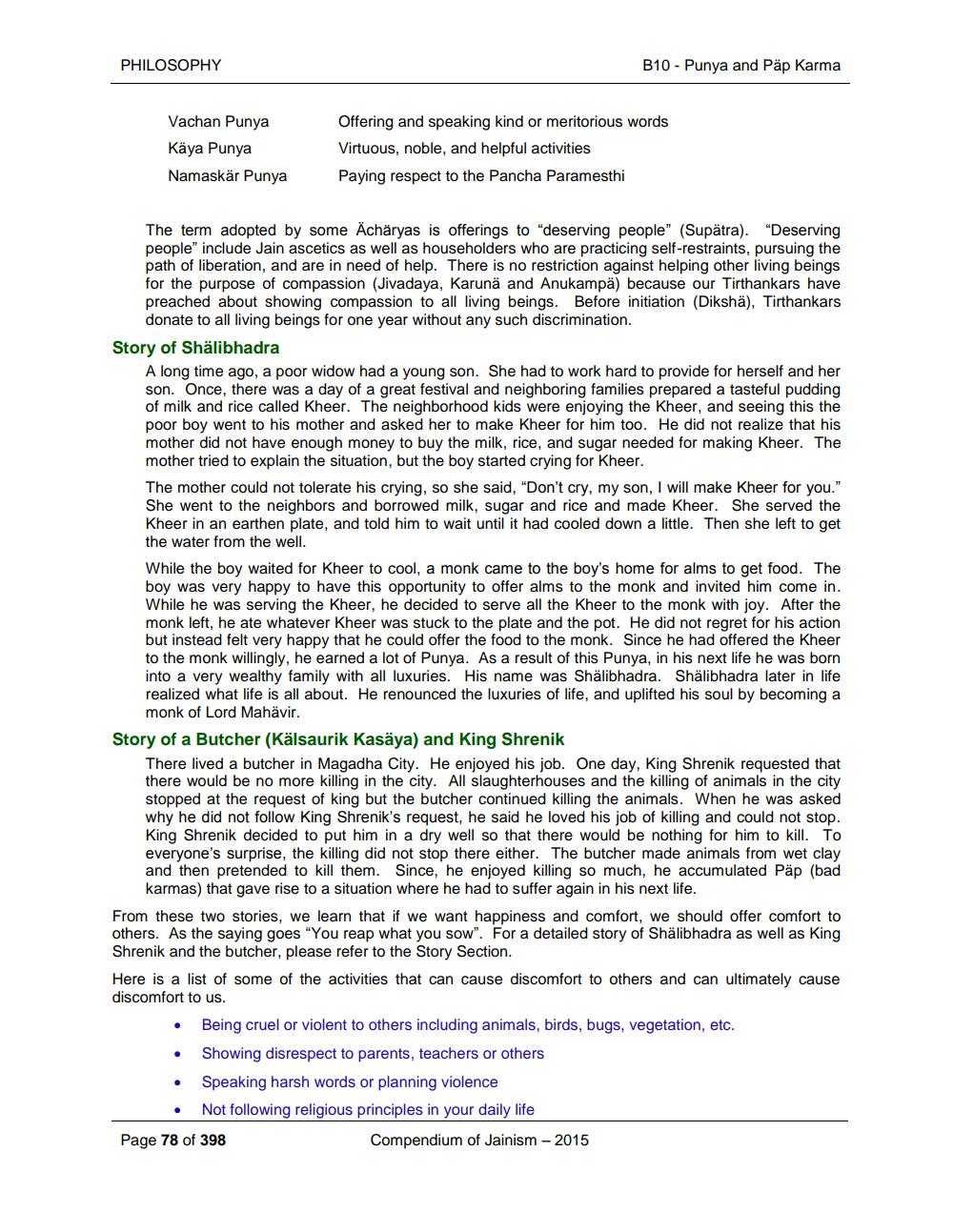________________
PHILOSOPHY
B10 - Punya and Pap Karma
Vachan Punya Käya Punya Namaskar Punya
Offering and speaking kind or meritorious words Virtuous, noble, and helpful activities Paying respect to the Pancha Paramesthi
The term adopted by some Achäryas is offerings to "deserving people" (Supätra). "Deserving people" include Jain ascetics as well as householders who are practicing self-restraints, pursuing the path of liberation, and are in need of help. There is no restriction against helping other living beings for the purpose of compassion (Jivadaya, Karunä and Anukampa) because our Tirthankars have preached about showing compassion to all living beings. Before initiation (Diksha), Tirthankars
donate to all living beings for one year without any such discrimination. Story of Shälibhadra
A long time ago, a poor widow had a young son. She had to work hard to provide for herself and her son. Once, there was a day of a great festival and neighboring families prepared a tasteful pudding of milk and rice called Kheer. The neighborhood kids were enjoying the Kheer, and seeing this the poor boy went to his mother and asked her to make Kheer for him too. He did not realize that his mother did not have enough money to buy the milk, rice, and sugar needed for making Kheer. The mother tried to explain the situation, but the boy started crying for Kheer. The mother could not tolerate his crying, so she said, "Don't cry, my son, I will make Kheer for you." She went to the neighbors and borrowed milk, sugar and rice and made Kheer. She served the Kheer in an earthen plate, and told him to wait until it had cooled down a little. Then she left to get the water from the well. While the boy waited for Kheer to cool, a monk came to the boy's home for alms to get food. The boy was very happy to have this opportunity to offer alms to the monk and invited him come in. While he was serving the Kheer, he decided to serve all the Kheer to the monk with joy. After the monk left, he ate whatever Kheer was stuck to the plate and the pot. He did not regret for his action but instead felt very happy that he could offer the food to the monk. Since he had offered the Kheer to the monk willingly, he earned a lot of Punya. As a result of this Punya, in his next life he was born into a very wealthy family with all luxuries. His name was Shalibhadra. Shalibhadra later in life realized what life is all about. He renounced the luxuries of life, and uplifted his soul by becoming a
monk of Lord Mahävir. Story of a Butcher (Kälsaurik Kasaya) and King Shrenik
There lived a butcher in Magadha City. He enjoyed his job. One day, King Shrenik requested that there would be no more killing in the city. All slaughterhouses and the killing of animals in the city stopped at the request of king but the butcher continued killing the animals. When he was asked why he did not follow King Shrenik's request, he said he loved his job of killing and could not stop. King Shrenik decided to put him in a dry well so that there would be nothing for him to kill. To everyone's surprise, the killing did not stop there either. The butcher made animals from wet clay and then pretended to kill them. Since, he enjoyed killing so much, he accumulated Päp (bad
karmas) that gave rise to a situation where he had to suffer again in his next life. From these two stories, we learn that if we want happiness and comfort, we should offer comfort to others. As the saying goes "You reap what you sow". For a detailed story of Shalibhadra as well as King Shrenik and the butcher, please refer to the Story Section. Here is a list of some of the activities that can cause discomfort to others and can ultimately cause discomfort to us.
Being cruel or violent to others including animals, birds, bugs, vegetation, etc. • Showing disrespect to parents, teachers or others
Speaking harsh words or planning violence Not following religious principles in your daily life
Page 78 of 398
Compendium of Jainism - 2015




